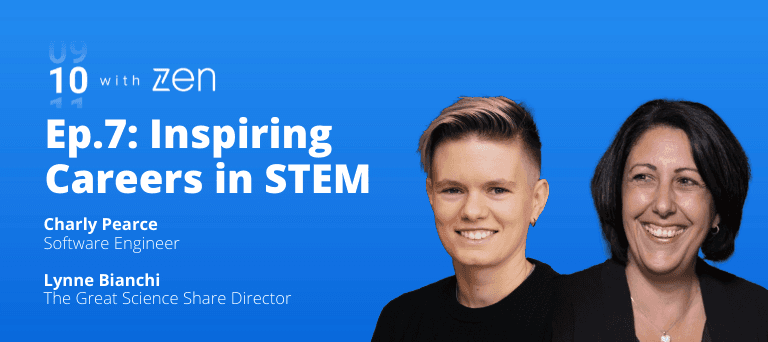Andrew King
17 May 2021
10
min read

Helen Woodward sat down to chat with Lynne Bianchi (Director of SEERIH at the University of Manchester and Director of the Great Science Share) and Charly Pearce (Software Developer at Zen Educate and former SEN teacher) for Episode 7 of 10 with Zen.
We’ve provided a transcript of the interview below, but you can watch a video of the podcast in full right here!
Helen: Charly, I’m going to start with a question for you! Can you tell us about what interested and excited you at school, and how you came to work in tech?
Charly: It’s a long and complicated story, really. At school I liked technology-type-stuff, but wasn’t big on maths. Personally, I find logic and maths quite hard. I wasn’t encouraged too much in school to go down a science route at all, really. My journey from college to university was all music tech related, and I was very lucky to have the support of my parents in that way, because they never went to uni. They just wanted me to enjoy what I do, and I think having that support is really, really important. I did a bit of editing work in TV, but I didn’t really like the culture. It felt very cutthroat and should have felt more collaborative than it actually did. Then I started working with kids with autism, which led to me becoming a TA, which led to my teacher training. But I love technology and working with computers and things like that, and I thought I needed a change. So I turned my hand – at the grand old age of 35 – to software engineering. And here I am!
Helen: Wow! So it sounds like a lot of your music tech work was self-taught?
Charly: Yes, just following the path of your highest excitement and highest inspiration.
Helen: Lynne, I know that one of your mantras is ‘science and engineering is for everyone’. Can you tell us some of the data around career choices and at what age children start selecting out of some of those opportunities?
Lynne: Sure, thanks so much Helen, and thanks so much to Zen for inviting me on this podcast. It’s very exciting, a great time of year for us to be having this conversation as we’re running up to the Great Science Share this June. You’re quite right to focus in on the career choices that children make. I suppose we wouldn’t expect young children to be making choices about careers, because it’s a long way off from primary school. But actually, there’s some evidence from King’s College gathered by Professor Louise Archer that shows children nowadays are making those choices about whether to stay in STEM – or have an identity with STEM, that’s really the way to put it – from as young as eight. So in the past there’s been a lot, as we know, around outreach activity and careers in secondary schools, but actually that’s too late. I think that’s because our culture has changed, and our young children are getting older much sooner, and they’re quite wise little characters nowadays. Just having three daughters myself I know how quickly they grow up through those junior years, and that’s when we’ve got to catch their interests. High quality experience in science and engineering in the primary years is essential, not because we want to churn out lots of scientists and engineers, but to have a choice to say ‘science is for me’, or ‘I’ve tried it and I feel aligned with something else’. If you don’t get that rich opportunity, you’re not going to manage to make that informed choice.
Helen: That’s really interesting, and as young as eight is almost shocking. Because you realise that unless we open up those inclusive opportunities very early on, and give those messages really early on, children and young people can, without knowing it, lose identity with science and engineering subjects.
Charly: Even as educators and others that work in schools, we’re really battling against a society that has so much coding within it that says ‘these are the girls’ things’ and ‘these are the boys’ things’. If you’re raised and socialised as female or male, you get these messages so hard from such a young age that by the time you’re a teenager it’s almost too late, because these things have been happening since these kids were babies. So we’ve really got to push back against this bigger force, if you will, and show the kids that actually, it’s for everybody.
Lynne: Yes, it’s not just about the children. Nowadays it’s also about the family as a whole. Because those conversations are happening every day, around the breakfast table if we have one. Your parents are such a massive influence on the way that you think. ‘Can I be this?’ ‘Can I be that?’ Not everyone has a rich knowledge of science and what diversity of careers are out there now, which are just so different to when we grew up. So I think family, school and child – that’s the mix isn’t it? That’s what we’ve got to get right.
Helen: Charly, I’ve got to ask you, what would your message be to young people who are interested in a career in tech but just aren’t confident in their abilities?
Charly: I think that representation is really, really important. If you can, find someone who reflects something you identify with, or looks like you, or seems like you, in that field. Follow them on social media, find out about their journey, and reach out. Find a community that can help and support. Like I said, if you’re socialised female or socialised male, you’ve got different things to work against. So being aware that there’s this code is really helpful. Think ‘well, people say that this thing isn’t for me, but I like it, so it is for me!’ Having that little mantra and self-belief really helps.
Helen: So that sounds like, if you can, seek out a role model and a mentor, and get in touch with them. Again, I’m wondering if that’s something that schools need to be more aware of, or more active in creating those possibilities for links and mentors. Some children have them naturally through their families, don’t they? But actually, some children just don’t.
Lynne: That’s right. There was an interesting piece of work that we did a few years back now with some Manchester and Stockport schools, where they created a project called Science for Families. One of the first things they did was audit the playground! So it wasn’t about reaching out that far into where our industry links are, and how we’re going to make contact with this engineering company or that science and tech company. It was actually saying ‘who’s bringing our children to school today?’ When they audited the playground, they thought ‘what jobs are mum and dad in?’, ‘what job is auntie in?’, ‘what jobs have grandma and grandad just retired from?’ You saw the breadth of STEM careers, whether they acknowledged it or not. Some children didn’t acknowledge, for instance, a hairdresser to be a scientist, but they use a lot of science in the job. Let’s bring them in and support them to build that culture around our school.
Helen: That’s really lovely, actually, and how exciting that that was already in the community!
Lynne: There were all sorts! And I encourage teachers to do that. Audit your families, who’s out there?
Helen: That’s lovely. Now Lynne you’re leading us on to our last question. What can school leaders be doing to promote science and engineering for everyone?
Lynne: So I think school leaders do have a really big responsibility towards their teaching staff to build their confidence. Our primary schools are full of amazing teachers, but they’ve not all got a science background, they’ve not all got a strong level of confidence in their own capabilities within science and engineering. I think more time going into professional development around that would really help. It’s something that’s gone off the radar in the past few years due to the pressures of literacy, numeracy and safeguarding, so let’s bring that culture back, that every teacher is entitled to some STEM PD. School development plans are a great place to put an objective because that then will drive change, and it will also mean that we do it together, that no teacher is having to carry this by themselves. Science subject leaders are great to have but having a whole school culture of really putting science on the map for a year or two will really just bolster and invigorate opportunities. There are lots of us out here in the STEM education community so let’s open our eyes and our schools to who is out there that can support. There’s so many free resources! I think the real bottom line is to make your school an enquiring school. A school where questions are asked, questions are listened to, and questions are valued. Now I haven’t said questions are always answered, because that’s not always possible, but valuing children’s questions, giving them the choice, it’ll come back to what Charly said about her interests and curiosities. Perhaps they weren’t embraced and listened to enough in those formative years, but giving children that chance to have some control and decision making over some aspects of their learning would possibly give that strength to science really thriving back in our primary schools. Science in context: understand why we teach science in primary. It’s not just to cover the national curriculum, it’s to make sense of our world. We’re going to do that through questioning.
Helen: Thank you Lynne, that’s been wonderful to listen to. Your passion and your excitement comes through every time I hear you talk, which is really lovely. Lynne I’m just going to ask you to tell us – how schools can join the Great Science Share this year?
Lynne: I’m so pleased that you’ve asked me that. The Great Science Share for Schools is an annual campaign, it’s a UK-wide campaign that’s actually gone beyond the shores of the UK now which is amazing. It kicked off on the week of the 3rd of May with a series of 6 weeks of resources, and then culminates on the 15th June. Lots of people are saying at the moment ‘how do i get involved?’ The first thing to do is register on the Great Science Share website, then you’ll get lots of information. But the key to it is don’t try and bite off too much. Do what’s feasible – it’s just about doing a bit more science in this time between May and June, and celebrating it with us all on the 15th of June. We’ve got lots of live lessons and resources that are there, direct into the classroom. I can’t tell you how exciting it is! It’s all free, and there are hundreds of thousands of children involved this year which is just amazing.
Helen: Thank you so much for being our guests today, Lynne and Charly!
We’d like to thank Charly, Lynne and Helen for taking part. To make sure you don’t miss out on future 10 with Zen podcasts, give us a follow on Twitter and Instagram.



